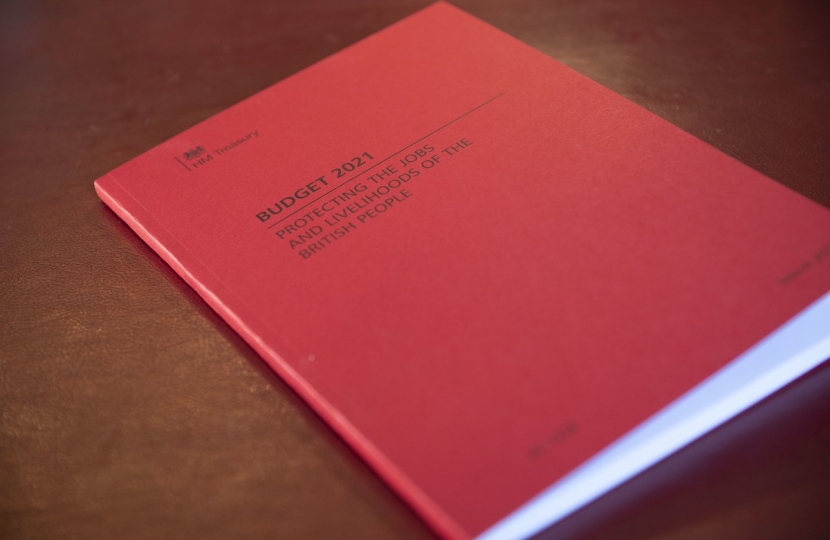
-
Key measures include extending furlough to the end of September, two further grants for the self-employed, a six-month extension to the Universal Credit uplift, and new grants and loans for businesses.
-
Announcements to build the economy include eight freeports, and a new Help to Grow scheme to boost the productivity of small businesses – delivering on the Conservatives’ agenda to level up across the country and build back better from the pandemic.
Rebecca Harris MP has welcomed the Spring Budget which provides billions of pounds to support businesses and families through the pandemic, delivers on the Conservatives’ promises it has made to the British people and invests in the UK’s future economy.
As part of the Government’s commitments to fund the nation’s priorities, the Budget confirmed:
- An extension of the Coronavirus Job Retention Scheme until the end of September, ensuring it continues to support employers as they begin to reopen. Two further grants will also be available to self-employed people – and the newly self-employed will also be eligible for both grants.
- A continuation of the temporary Universal Credit uplift for a further six months. The Budget also confirms new support for providing young people with new skills: including doubling the incentive payment to SMEs to take on apprentices of any age to £3,000, and £126 million to triple the number of traineeships next year.
- New Recovery Loans and a new Restart grant of up to £18,000 to help businesses as they reopen. Support for the sports, arts and culture sectors will also be increased by a further £700 million as they begin to reopen.
- Extending the business rates holiday, VAT cut and stamp duty holiday. There will also be a new mortgage guarantee scheme from April which backs 95 per cent mortgages – helping those with smaller deposits.
- Being honest with the British people about the need to fix the public finances. We are standing by our manifesto pledge not to increase Income Tax, NICs or VAT and we are freezing alcohol duty, and freezing fuel duty for the 11th year in a row. However to fix the public finances, corporation tax on large company profits will increase to 25 per cent in 2023. This will be tapered and 70 per cent of businesses will be completely unaffected.
- Announcing the locations of eight freeports in England, which will encourage free trade and bring investment to all regions of the country through lower taxes and cheaper customs. Including two in Essex Thames Gateway and Harwich.
- Launching the first ever UK Infrastructure Bank – located in Leeds – to invest in public and private projects to drive green growth and create green jobs.
- A new Help to Grow scheme to boost productivity of small businesses, to ensure they are embracing the latest technology and management training.
- Being honest with the British people about the need to fix the public finances. We are standing by our manifesto pledge not to increase Income Tax, NICs or VAT and we are freezing alcohol duty, and freezing fuel duty for the 11th year in a row. However to fix the public finances, corporation tax on large company profits will increase to 25 per cent in 2023. This will be tapered and 70 per cent of businesses will be completely unaffected.
- Opening up the new Levelling Up Fund for its first round of bids, worth £4.8 billion across the United Kingdom. The Budget also announces 45 new Town Deals to help spread opportunity across the country.
Commenting, Rebecca Harris MP said:
“Today’s Budget provides businesses and families in Castle Point with the support and reassurance they need to get through the pandemic. With £407 billion of support for families, jobs and businesses, it is right that the Chancellor is honest with the British people about our public finances.
“At the same time, I was elected on a commitment to level up communities like ours, and I am thrilled that this Conservative Government is now making good on that promise – by building our future economy and investing in every corner of the United Kingdom”.
As the IMF, Bank of England and OBR have all confirmed: our plan is working. As a result of our interventions, unemployment is now estimated to peak at far lower levels than previously expected, and our economy is now forecast to recover faster than previously thought as well.
The Government has helped the East of England throughout the pandemic by....
- supported 880,000 jobs in the East of England through the Coronavirus Job Retention Scheme.
- supported over 270,000 self-employed workers in the East of England with over £2.1 billion through the Self-Employment Income Support Scheme.
- supported over 145,000 businesses in the East of England with over £5.9 billion in loans through the Bounce Back Loan Scheme and the Coronavirus Business Interruption Loan Scheme.
- supporting up to 400,000 households in the East of England will benefit from the continuation of the £20 per week uplift to Universal Credit until October. This will be worth £500 over six months. The Government are also making a one-off payment of £500 to eligible Working Tax Credits claimants, to provide additional support over the next six months. Around 115,000 households in the East of England will be eligible to benefit from this.
The East of England will benefit from targeted support for local priorities
- 6 hospitals are being built in the East of England, with the continued growth of medical undergraduate degree places, with an additional 162 places in the East of England compared to 2017-18.
- The East of England will benefit from nearly £800 million in funding across 15 projects, as part of the Housing Infrastructure Fund, and major works on the A12, A47 & A428.
- Nine local authorities in the East of England will be priority places for the £220 million Community Renewal Fund, which will invest in people, communities and businesses across the UK. The Government are launching the prospectus for the Community Renewal Fund at Budget.
- Investing in flood defences. The next £5.2 billion Flood and Coastal Defence programme kickstarts in April.
- Southend and Stansted airports will benefit from Airport and Ground Operations Support Scheme extension and will help support their fixed costs, such as business rates. The freeze in air passenger duty for short-haul flights will benefit flights departing from the East of England, while the long-haul economy rate will only increase by £2.
Extending the business rates holiday
Last year the Government provided an unprecedented 100 per cent business rates holiday for all eligible businesses in the retail, hospitality and leisure sectors – a tax cut worth £10 billion. This year, the Government will continue that 100 per cent holiday for the first three months until June, before cutting rates by two-thirds for the remaining nine months, up to a maximum £2 million per business. That means the vast majority of businesses will receive a 75 per cent cut in their bill next year – a tax cut worth £6 billion.
Extending the VAT cut
To protect the 150,000 hospitality and tourism businesses which employ around 2.4 million jobs and have been hardest hit, the Government are extending the 5 per cent reduced rate of VAT for a further six months until the end of September. The rate will then increase to 12.5 per cent from October until the end of March, before returning to the normal 20 per cent rate from April 1. Overall, that’s a tax cut of nearly £5 billion next year.
Delivering new Recovery Loans to replace our existing loan schemes
Our schemes have provided £70 billion of support to 1.5 million companies. But as these come to an end, we are introducing new Recovery Loans to take their place: loans from £25,000 up to £10 million, with an 80 per cent Government guarantee.
Helping people to get better skills for them to get better jobs
The Government have already launched the Restart scheme to help hundreds of thousands of long term unemployed; doubled the number of Work Coaches; introduced the Lifetime Skills Guarantee to fund Level 3 Qualifications for all adults; and launched the Kickstart scheme to help 250,000 young people into work. Today the Government go further by doubling the incentive payment to small businesses to take on apprentices of any age to £3,000, alongside £126 million to triple the number of traineeships next year.

